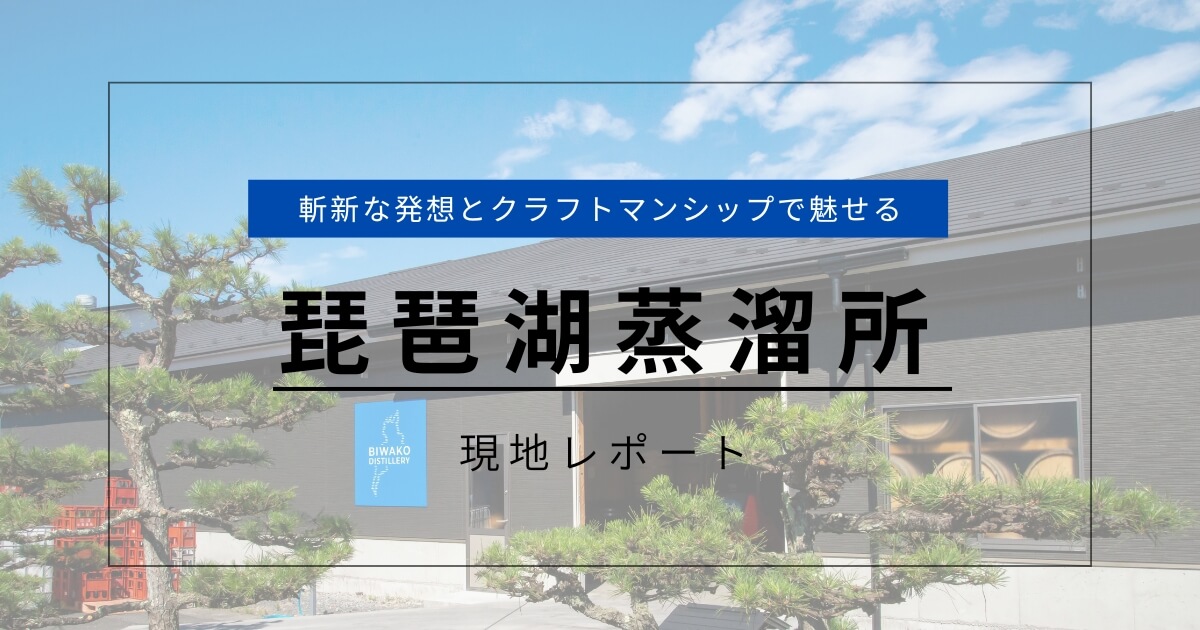
【現地レポート】斬新な発想とクラフトマンシップで魅せる琵琶湖蒸溜所
- 造り手
- 蒸溜所(日本)

The brand-new 200-year-old Bladnoch Distillery, described by Master Distillery Nick Savage, carries a unique history and narrative within its vast range of whisky selections. Succeeding the legendary Ian McMillan, Nick brings new life into both Bladnoch Distillery and the industry at large.
What drove Nick to his glorious career were his unwavering dedication and remarkable expertise.
In Part One of this interview article, discover how Nick’s journey has shaped him into a renowned figure, bringing new waves to the whisky world through his unique skillsets and creativity.
【Exclusive Interview】Part2: Nick Savage – Master Distiller of the Bladnoch Distillery
【Distillery Visit】Bladnoch Distillery: Queen of the Lowland
Dear WHISKY:
How did you join the whisky industry?
Nick:
After getting my PhD in structural mechanical engineering and studying tennis rackets in Australia, I returned to my home country, Scotland and worked in a steel factory in Sheffield. One night, after I had some drinks with my mates and we were slightly hungover, I was checking my emails for job adverts.
This one advert came through that only said, “Optimise a whisky cask.” That was it.
Dear WHISKY:
What was your initial reaction?
Nick:
Well, it didn’t say work for whom or anything; it just said optimise a whisky cask, so I needed clarification. Nevertheless, all my friends immediately said, “Well, you’ve got to try that because we can get free whisky.”
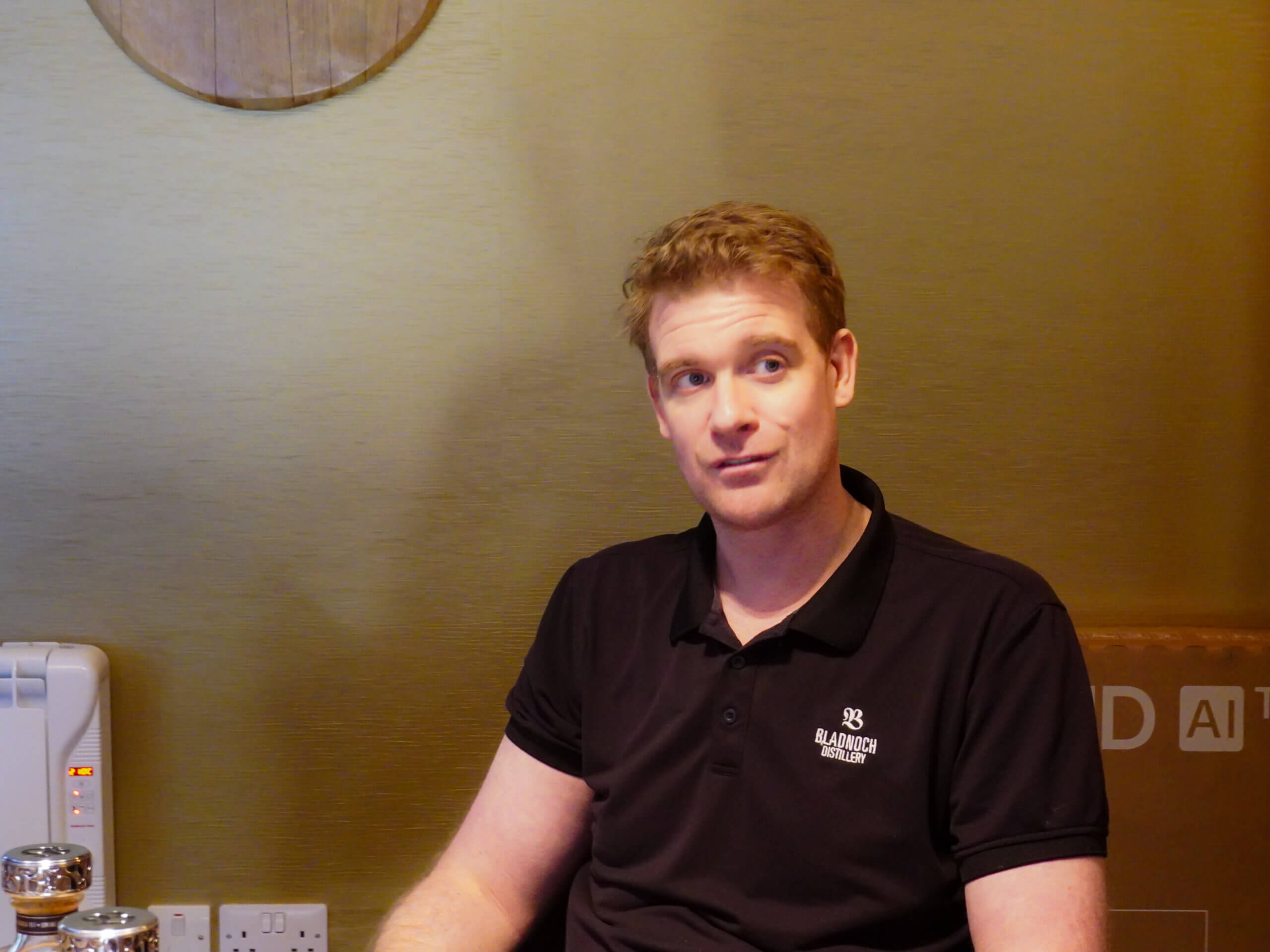
Nick remembering the early days of his career
Dear WHISKY:
Who was the advert from, and what were they looking for?
Nick:
That was Diageo, and they wanted an engineer to examine the durability and lifespan of the casks and how to reduce the Angel’s share. That’s how I transitioned from a tennis racket to a whisky cask.
Dear WHISKY:
Were you a big fan of whisky at that point?
Nick:
I liked it; I even remember having whisky that night before I got that email. I was 25 or 26 years old then so, I could have a whisky, but I did not really appreciate it. I have a sweet tooth, so I often fancied Bourbon and Coke.
I knew very little about whisky, zero knowledge by comparison to now.
Dear WHISKY:
Did working at Diageo teach you more about whisky?
Nick:
When I joined Diageo in 2007, many things clicked for me. Suddenly, I started to understand concepts like Jameson is Irish whiskey and what goes into Jonnie Walker 12 years old. As I continued working at Diageo, my knowledge developed even further. I gained insights into the unique characteristics of each distillery, learning about their individual tastes and the factors that shape certain flavours.
Dear WHISKY:
How did Diageo change your impression of whisky?
Nick:
I started to have more appreciation for any kind of whiskies.
Although there are some whiskies that I do not like, there is nothing that I don’t understand about particular whisky.
For example, many peat whiskies are too much for me, but I admire what they’re trying to do. I apprehend how they’re running the distillery and see who they’re trying to talk to. That is the sort of appreciation I have for whisky now.
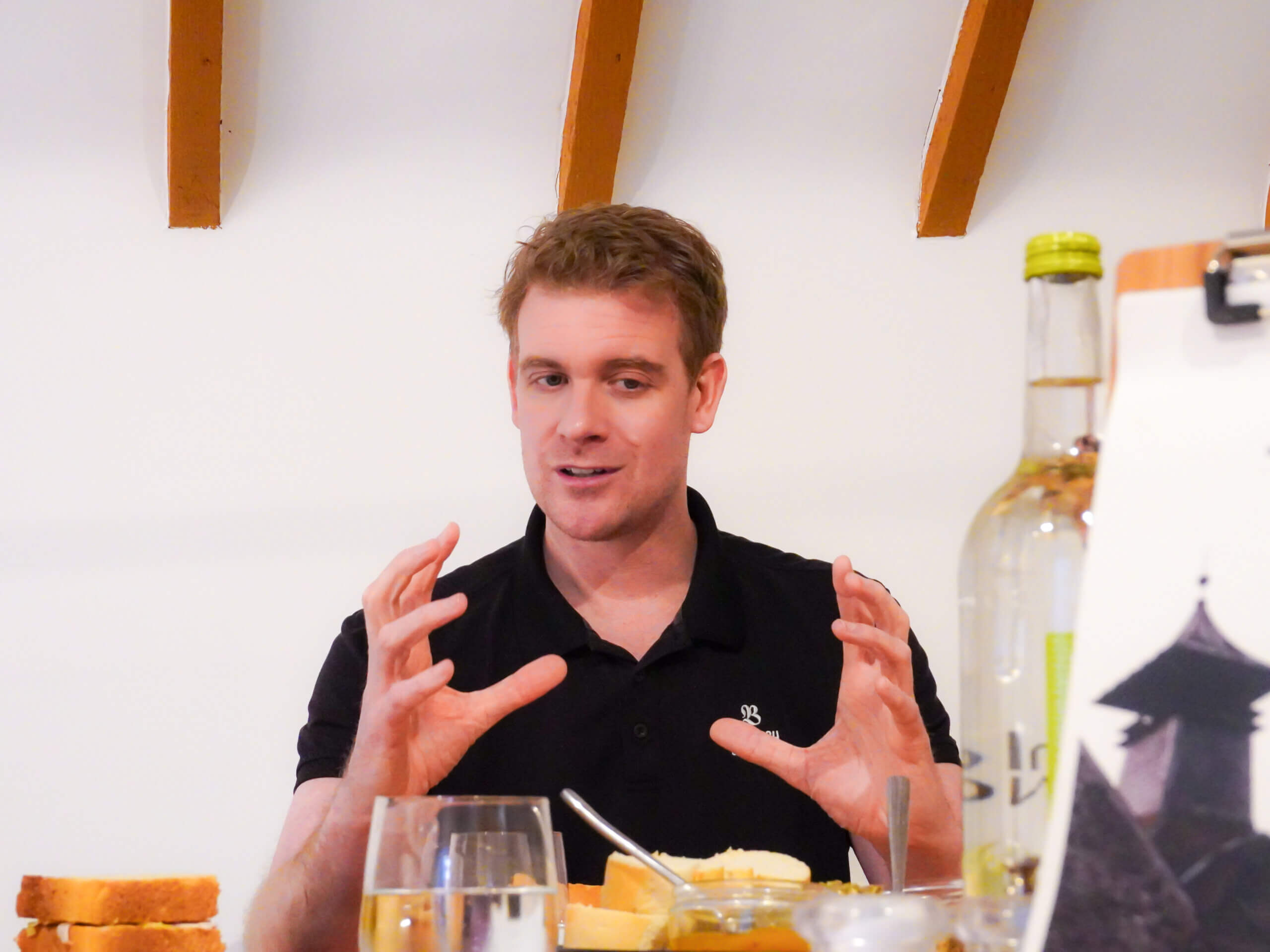
Nick explains how he has an appreciation for every whisky
Dear WHISKY:
What was your next role in the industry?
Nick:
After eight years with Diageo, where I dealt entirely with casks, I went to William Grant & Sons and worked as a Distilling Technical Leader at Girvan Distillery.
This experience took me to the opposite of whisky production, where I understood how brewing and distilling work.
Dear WHISKY:
What was most different about working at Girvan?
Nick:
I was exposed to a lot of new things about gin and grain whisky production. Girvan pretty much does everything, so if you ever want to learn about brewing or distilling, Girvan is the place to go.
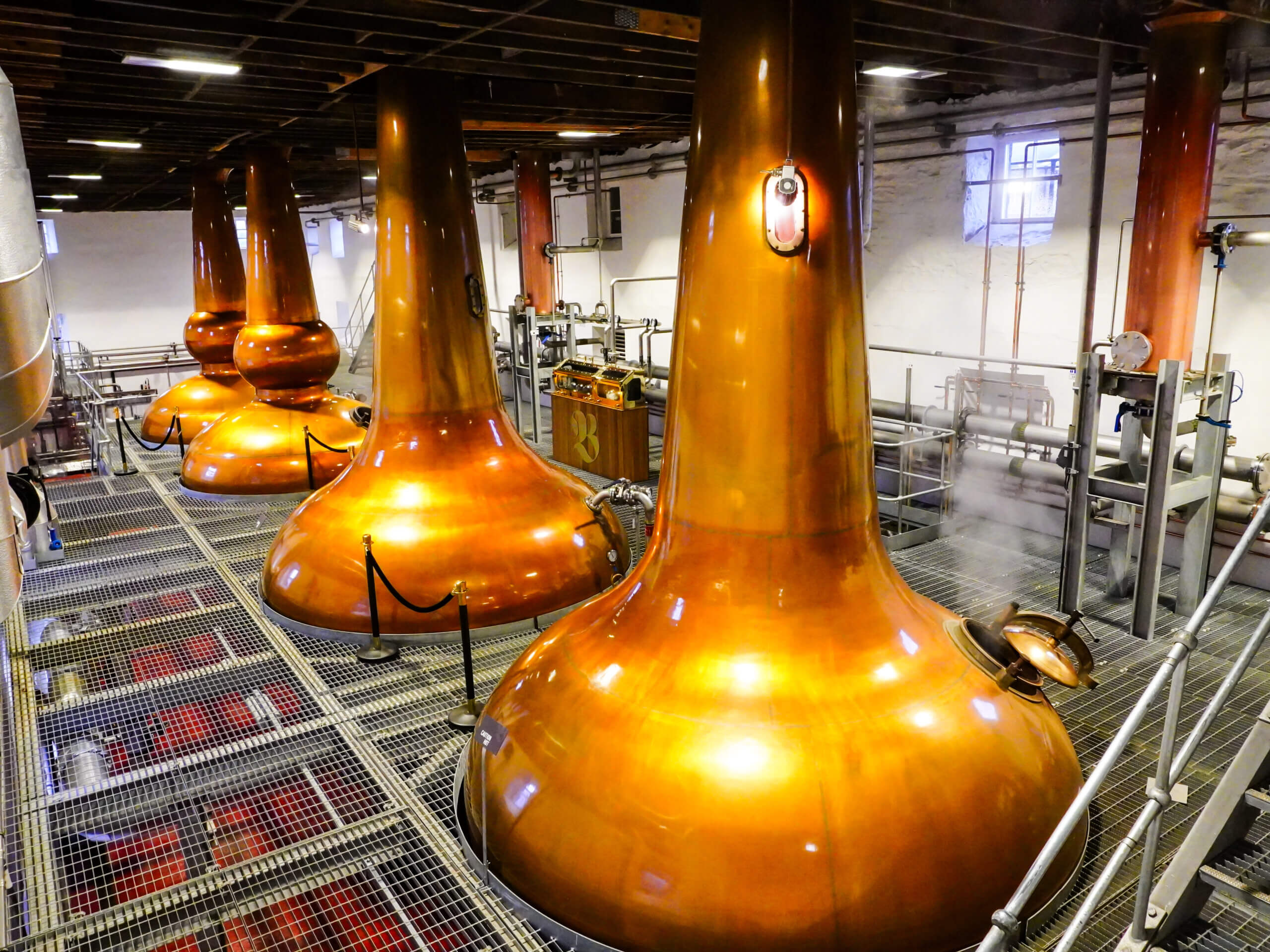
Pot still at Bladnoch. Nick oversees production and management
Dear WHISKY:
Which branch did you work the most at Girvan?
Nick:
Whichever one wasn’t working, so I moved around. Working very much like technical support, I picked up a lot of things. I was fortunate to be in that environment, obviously very tough, but you become resilient and respectful and also learn how to learn quickly. The annual production capacity was 112 million litres during my work time, so if something’s wrong, it costs a lot of money instantly.
Dear WHISKY:
How did you join Macallan?
Nick:
They asked me to apply for Master Distiller. It’s not like they will hand it to you; they thought I was a good candidate, so they basically called me in for an interview.
Dear WHISKY:
What does it feel like to be called in like that?
Nick:
I think of it as if I’ve earned the right to fail. Distilleries are going, “Okay, you need to learn a lot, but we think you’ve got the right mindset”, or “We see that you want to go for it, so we’ll give you the opportunity.” And I went, “Okay, hold my beer.” That’s the sort of spirit.
Dear WHISKY:
What do Master Distillers do?
Nick:
I have always thought of it as a custodian. For me, it’s all about making sure that whiskies are protected. We need to make sure everyone understands what we do and the culture.
Most importantly, make sure that the whisky in the bottle respects the stocks that we have.
This is because, ultimately, I will hand this position to someone else. So you have got quite a lot of respect going into this role.
Dear WHISKY:
What was your mindset when going into work?
Nick:
First, no matter what we’re doing, I always turn up to work. The mindset at the beginning of the day is always, “Don’t get fired.” You work hard; otherwise, they will find it out and fire you. So you come, you go for it. I arrive at eight o’clock, very rarely have lunch, and go, “What’s next? What’s next? What’s next?” – and I love it!
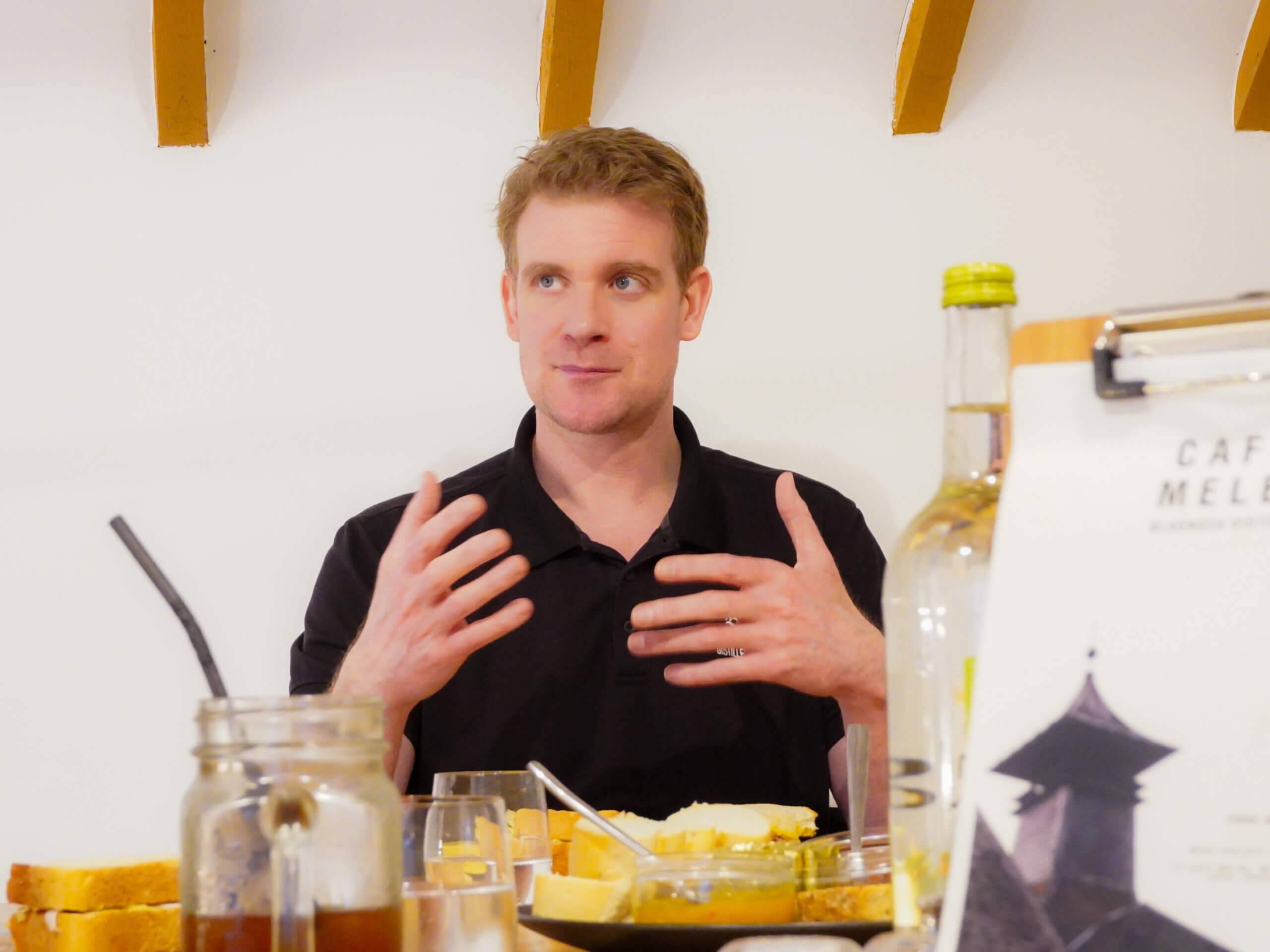
Nick explains what it means to be the Master Distiller
Dear WHISKY:
What is the key to not getting fired?
Nick:
If you’re working hard and delivering, you don’t get fired. You leave work in the evening and say, “Yes, didn’t get fired,” then start again the next morning. That, for me, is the mentality. Work hard because this is a given opportunity, and I will make the most of it. I also understand that I’m just keeping this chair warm. Bladnoch has been here for 200 years; it will be here for another 200 years. Someone else will sit in my chair, 5, 10, 15, 20 years or however long years later.
Dear WHISKY:
What does it take to have the mindset of a Master Distiller?
Nick:
You work hard. You keep concentrating on what you’re doing because you’ll learn at least something.
One of the key things I always thought was you’ve got to listen to everyone around you.
Having great ideas and getting excited, that’s great. However, the reason I’ve got into this type of chair is because of the people in the room.
Dear WHISKY:
Why is it so crucial for you to listen to others?
Nick:
I’ve been lucky enough to meet people who have more extensive knowledge than me, more than I’ll ever know. That is why I listen to them, let them tell me what they think, and respectfully follow their advice. That marries up with being a custodian and having respect for the whisky.
Dear WHISKY:
Won’t you eventually be in a position where you would have no one advising you?
Nick:
There is a quote I like, “If you’re the smartest person in the room, you’re in the wrong room.” You have to keep moving and keep making sure that people are helping you and you are helping them. Trying to think a bit differently, try and put it all together. We make mistakes sometimes, but we also get things right sometimes.
Dear WHISKY:
Do you listen to consumers’ voices or comments a lot as well?
Nick:
I try to stay in my own bubble because for all the good stuff people say, there’s also critique, which can drive me. For me, nobody knows about Bladnoch.
I would rather do what we want to, and people would follow if they wanted to.
But we do it for the right reasons; I think that’s important.
Dear WHISKY:
How did you join Bladnoch?
Nick:
David Prior, the owner of Bladnoch, contacted me with this opportunity to work with him. He didn’t say it as a blank canvas; he told me he would help but expected me to make and build the distillery with him. David is very hands-on with his brand, but he also respects everyone’s skills. He once said, “I employ you to do the job. You are the skilled one in that area. I trust you to do it. And if you fail, then that’s a different story.”

Logo of the Bladnoch Distillery
Dear WHISKY:
What about Bladnoch caught your interest?
Nick:
Opportunity to do something new. When I was at Macallan, it was very much at the top saturation part of growth. While Bladnoch was in a very early, exciting, and entrepreneurial stage, and there was a mark to be made and a distillery to be built.
That was my main drive to think, “Let’s test this.”
Dear WHISKY:
What has changed the most compared to Bladnoch before you joined?
Nick:
When I arrived in 2019, there were only 14 employees, and now we’re at 65 or 66 employees after only five years. I am most proud of building that workforce here in the local community. I find that very important.
Dear WHISKY:
What were your first days at Bladnoch like?
Nick:
Since I wanted to recognise and respect their distillery, I took time speaking to everyone, figuring out what drives them. Additionally, I asked every single cask to be sampled to understand more about the distillery itself.
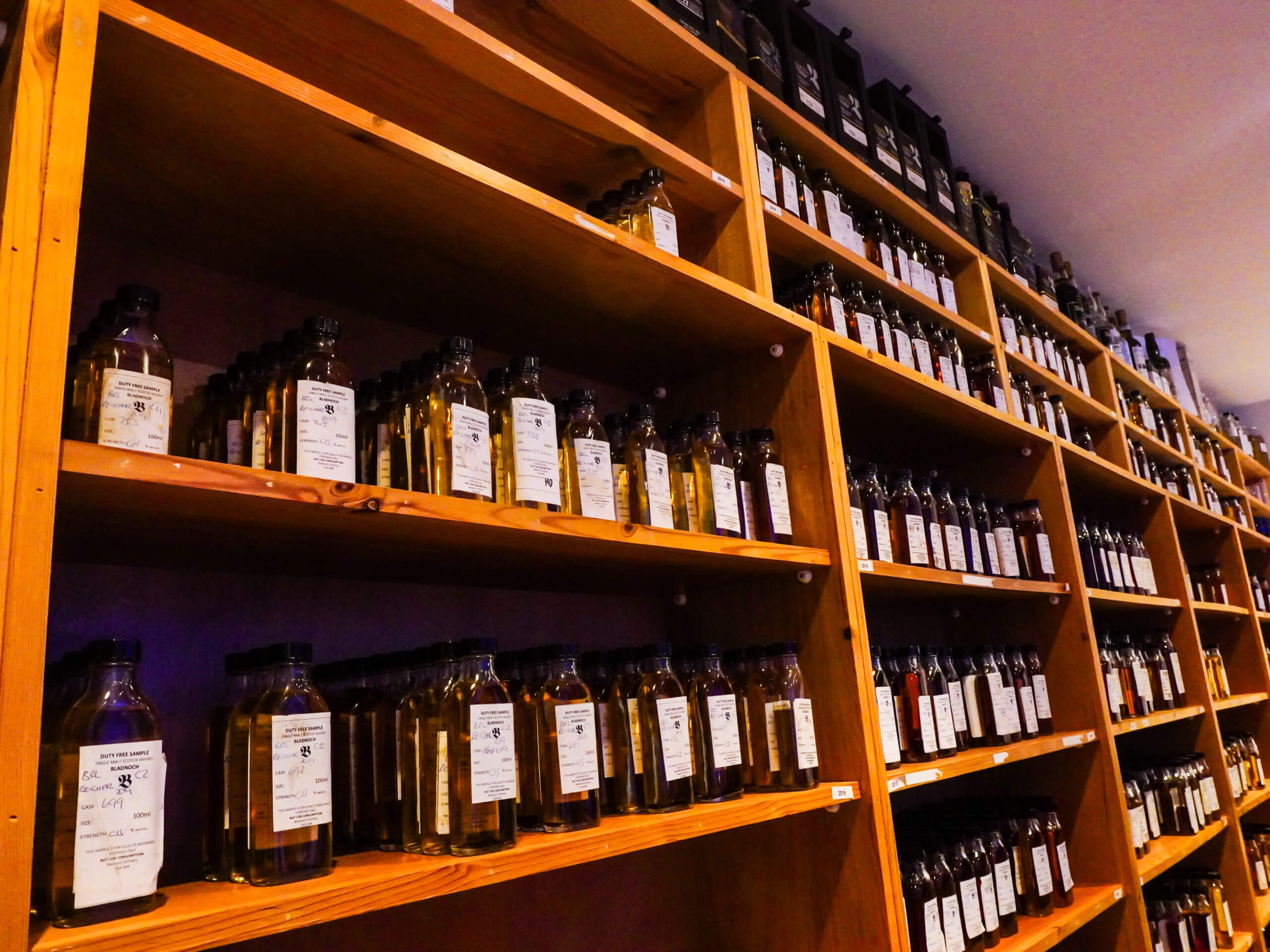
Samples of every single cask Bladnoch has
Dear WHISKY:
Why did you sample everything at the beginning?
Nick:
We only had a small amount of stock, so I knew that if we did not use them correctly and sustainably, we could waste them and have no whisky left.
Dear WHISKY:
Why is this so important?
Nick:
We only get to produce cool stuff when we understand what is in there, how it is developing, what products you need to make, and you link it all up.
Just like a custodian, I would say.
Dear WHISKY:
How often do you renew these samples?
Nick:
It’s constantly being put in and taken out as new whiskies are added daily. I take samples at 3 or 4 years old since that is their first peak. Of course, I would re-sample once in a while to check the flavours, but I can make a good or bad assessment at the three-year stage, and they will stay as good or bad whisky even after ten years.
Dear WHISKY:
How do you come up with recipes?
Nick:
Let’s say I was told to make 11 years old. Then, I will pick up some Bourbons, which are grouped based on different flavours, such as honey or cereal, and try to match the previous 11-year-old by playing around with ratios.
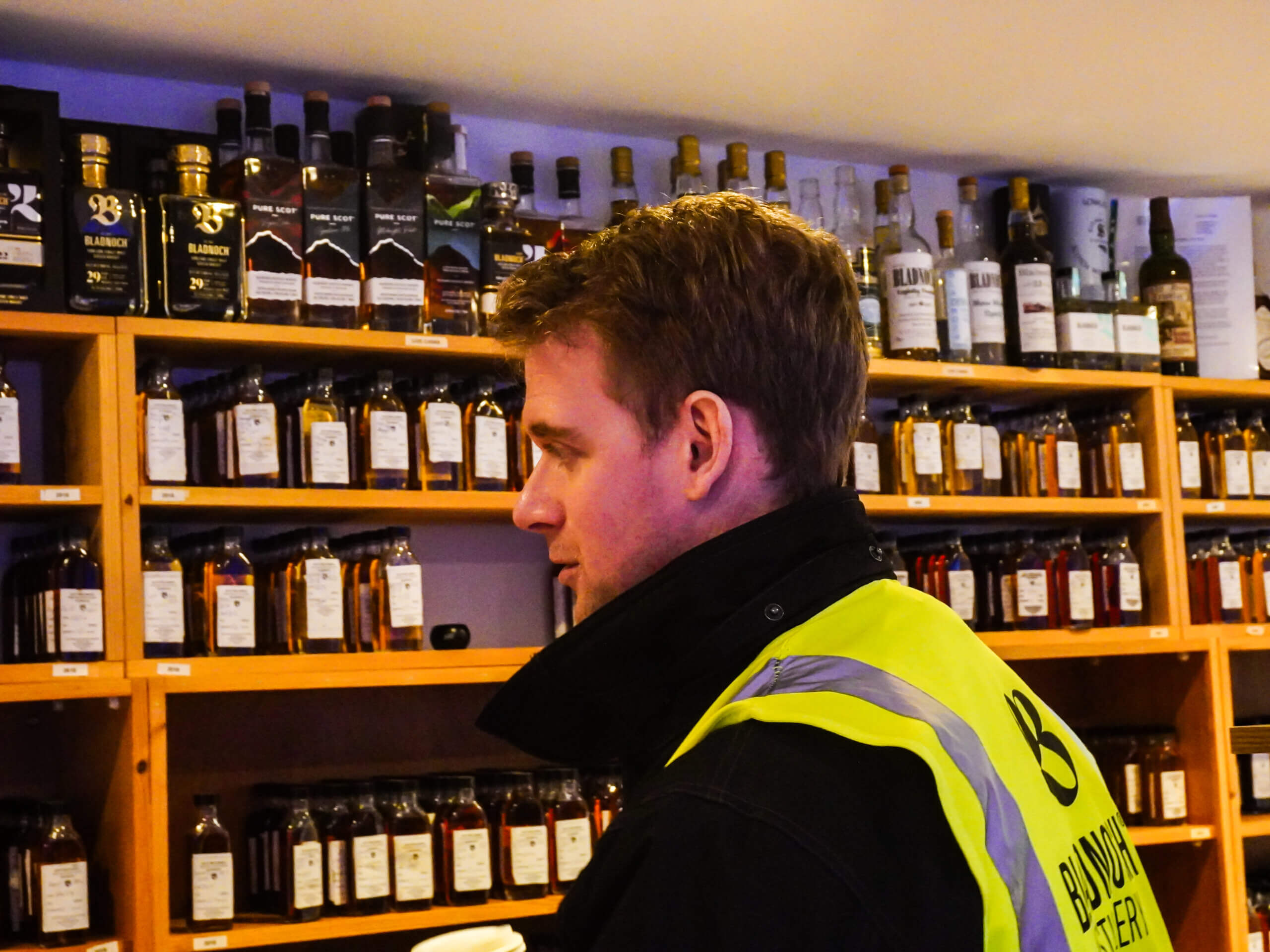
Nick spends hours in this sample room to come up with the recipe
Dear WHISKY:
What else do you commit to as a Master Distiller?
Nick:
We would need to keep some honey and cereal, whatever the style might be since they are two prominent flavours. And when certain casks aren’t performing, they will need better casks to carry them. So, I have to think 5 or 6 years ahead. We got to make 11-year-olds for the next 5-6 years. That’s the idea of it. If we were not getting it right for the future stock, the person sitting in this chair next would probably be mad at me.
Dear WHISKY:
What is your role in Bladnoch Distillery?
Nick:
The Master Distiller is the head of operations. We could be doing anything each day. It could be health and safety in the morning and packaging, bottling, or anything for the rest of the day. I was working on label design this morning and choosing a music.
Dear WHISKY:
What do you mean by choosing a music?
Nick:
It’s for our next series of releases. I chose the picture, video, and music for promotional purposes to make sure they complement the characteristics of the whisky.
Dear WHISKY:
As a custodian of Bladnoch Distillery, how do you treat your distillery?
Nick:
I describe Bladnoch as a brand-new 200-year-old distillery.
That is why I always tell everybody at the distillery to keep everything clean, tidy, and perfect.
And that’s important. If you were walking around the distillery and it was messy and not taking care of the planet, you’ll think, “Well, how good can the whisky be?”
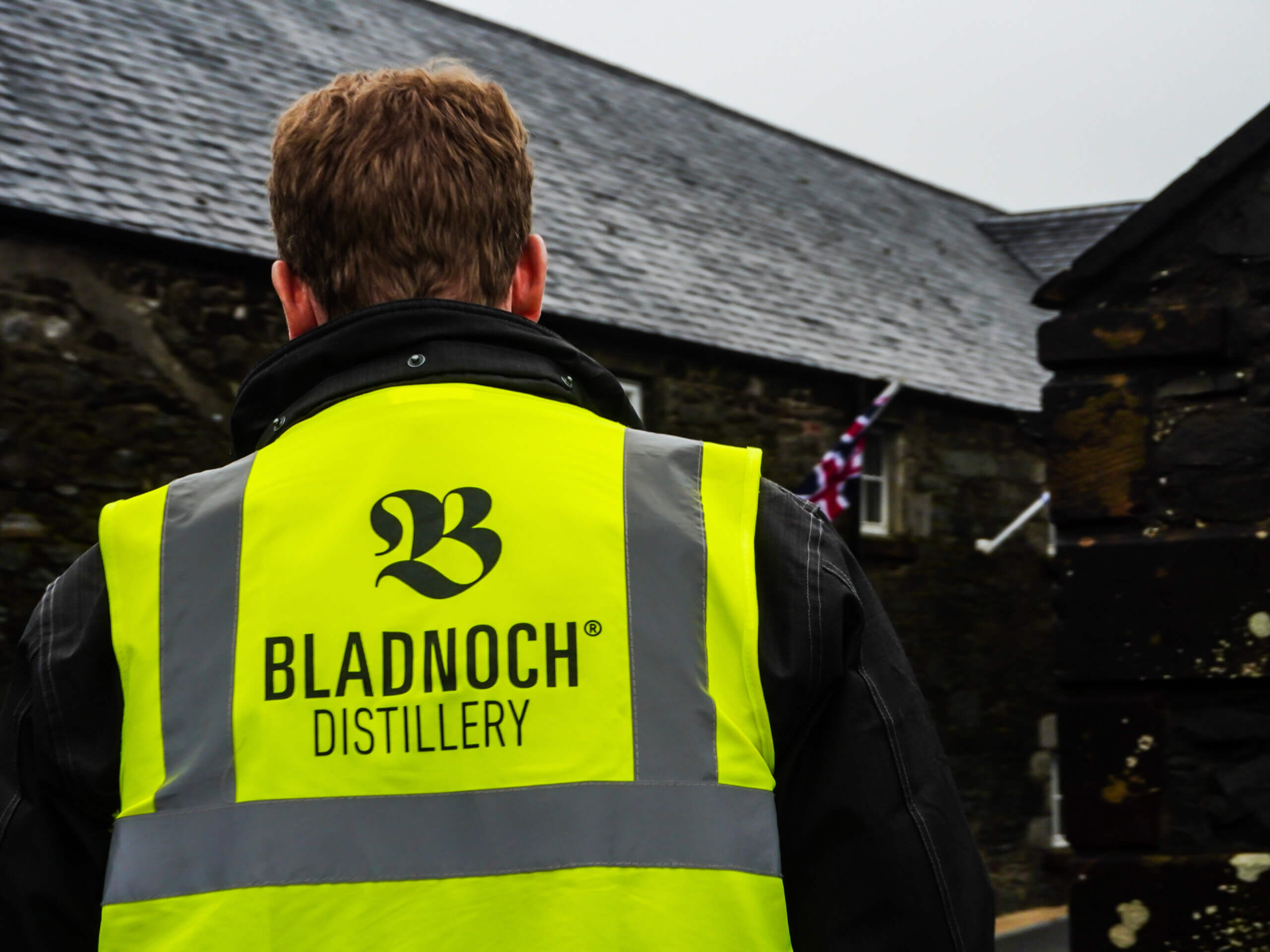
Custodian of the brand-new 200-years-old distillery
Nick has spent 17 years in the whisky industry, gaining expertise in cask management from Diageo, experiencing production at Girvan, and building a solid reputation as the Master Distiller at Macallan.
Today, he uses these valuable resources to create a legacy at Bladnoch Distillery. Nick is the perfect fit as the custodian of the brand-new 200-year-old distillery, embodying the spirit of innovation and tradition that defines the Bladnoch Distillery. Nick’s dedication to the brand and stocks is a source of inspiration, reflecting his unwavering focus on both the present and future-proofing Bladnoch for another 200 years.
In the second part of this article, Nick explains the Bladnoch-style classic whisky and its importance while also highlighting his unique creativity in whisky-making through the globally recognised “Waterfall series.”